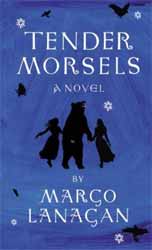|
Click here to return to the main site. Book Review
Liga begets two daughters, one by her father and another following a gang-rape. Distraught by the course of her life she attempts to kill herself, only to be given the option of living in her own private paradise. Her home is transformed into a safe place for Liga and her daughters, Branza and Urdda, but paradise doesn’t last forever and as time passes the membrane which separates Liga’s family from reality begins to become permeable allowing strangers to enter and offering the chance of escape for her daughters... From the very first line, Margo Lanagan’s Tender Morsels challenges the reader with a tale of rape, incest and the loss of innocence. This is a book which falls into the ‘Young Adult’ category, and I can imagine some crusty critics being appalled at some of the content of the book, certainly the first fifty pages, or so, are a catalogue of miscarriage, rape and birth, which fluctuate between being alluded to and being graphically rendered for the readers mind. But then I vaguely remember my late teens and would have been equally appalled to have my reading habits censored. The book is very much like its structure, combining real world events juxtaposed with the magical world. We are never really sure about our location, nor is Lanagan specific about this apart from painting a picture of some backward quasi-medieval rural community. The use of language, by the characters, does not point to any specific place. So, although Lanagan is an Australian author, there was nothing here to suggest that it was set there. If anything it had a mid-European feel to it and many of the motifs - log cabins, woods, bears, magical creatures and witches - are reminiscent of Grimm’s Fairy Tales. This may just be a reflection of my own cultural education and I can see readers in other countries seeing much of their own mythical landscape repeated here. Lanagan, demonstrates what appears to be a unique use of the English language. Not being well versed in Australian colloquialisms, idiomatic expressions and speech patterns, I was unable to decide if many of the words and phrases were a complete invention. Depending on the mindset of the reader, this will either delight, as it enhances the individual characters voice, throwing them into vivid relief, or create a level of doubt and confusion which is constantly pulling the reader out of Lanagan’s fictional world. The narrative can be split into two sections; the first half of the book chronicles Liga’s downfall and her realised promise of paradise, the second deals with her children negotiating reality, once the barriers have come down. What is interesting here is to compare Liga’s original position, trapped in a cabin by an abusive father, with little hope of escape and her repetition of that behaviour with her own children. Although the father appears to exert his control, without love, Liga attempts to do the same from the position of love, wanting to protect her daughters. But one person’s personal heaven may not be another’s, opening up the possibility of Liga repeating the abuse, even if she thinks it is in a noble cause. Urdda’s accidental transition into the real world exposes her mother’s idea of heaven to be the bland creation that it is. Whilst it may be full of safety and cute, friendly woodland creatures, it lacks the excitement and possibility of getting hurt which makes the exploration of life such an adventure. Although the book is undoubtedly well written, I did struggle to enjoy it, not because of its often dark nature or use of language, I just couldn’t seem to identify with Liga. This should not detract from the book's well constructed narrative or its richly drawn characters. In the end Liga, like many, has to examine the realities of life and how families cope with them, a theme with is universal to all and not just young adults. 7 Charles Packer Buy this item online |
|---|


